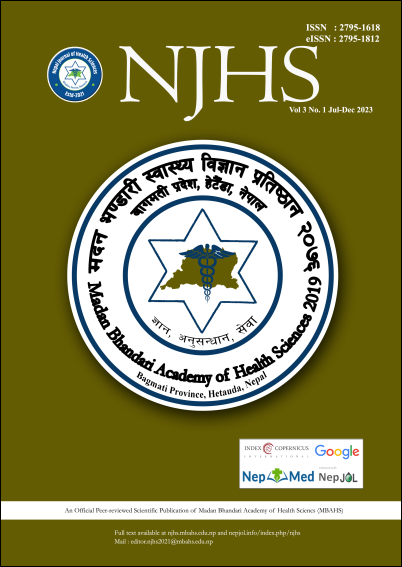Knowledge, Attitude, and Practice of Ergonomics Principles among Undergraduates Studying Bachelor of Dental Surgery
DOI:
https://doi.org/10.3126/njhs.v3i1.63305Keywords:
Awareness, ergonomics, musculoskeletal diseaseAbstract
Introduction: Ergonomics is the scientific discipline concerned with the understanding of interactions among humans and other elements of a system, and the profession that applies theory, principles, data and methods to design in order to optimize human well-being and overall system performance. Successful application of ergonomics, assures high productivity, evasion of illnesses and injuries, leading to increased satisfaction among workers. On the other hand, unsuccessful application can lead to work-related musculoskeletal disorders (MSDs) among dental professionals.
Objective: The objective of this study was to assess knowledge, attitude, and practice of ergonomics principles among undergraduates
studying bachelor of dental surgery.
Methods: A descriptive cross-sectional study design was carried out among 172 students studying bachelor of dental surgery at
Kathmandu Medical College, Kathmandu Nepal. Census technique was used to collect the data. A structured questionnaire was used as a data collection tool.
Results: The study revealed that nearly (69) 40% of the students had a knowledge about the ergonomic principles. Whereas, (112) 65%
students of all the years as a whole had a good attitude towards ergonomics. But only (34) 20% students as a whole were using the
principles of ergonomics into practice.
Conclusions: Although, (69) 40% had knowledge about ergonomics in dentistry. Only (34) 20% of the students had a practice
of ergonomics . Thus, improvement in the level of knowledge is required but more importantly the application of knowledge into practice is recommended for better dental practice.
Downloads
Downloads
Published
How to Cite
Issue
Section
License
Copyright (c) 2023 NJHS

This work is licensed under a Creative Commons Attribution 4.0 International License.




